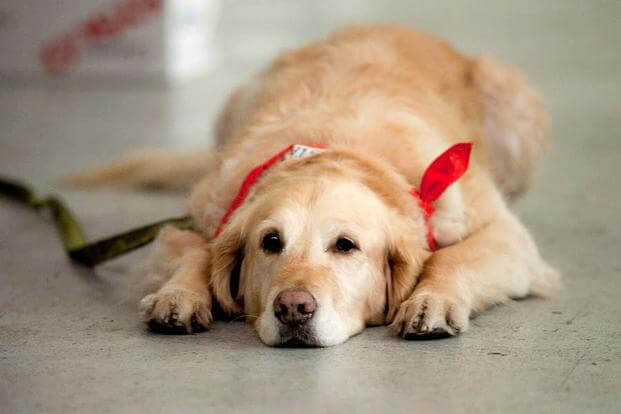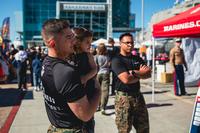Marine Corps Air Ground Combat Center, Twentynine Palms, California -- When traveling during a permanent change of station, owners must have a few things in order before their pet can travel along, especially when venturing overseas. Airports and destination countries will need updated medical records, arrival information and notice of arrangements to pick the animals up prior to landing.
As soon as a pet-owning servicemember receives orders for an overseas installation or in the United States, they should visit a veterinary office for information on the pet import requirements at their destination, said Army Capt. Erin Stough, veterinary corps officer, Combat Center Veterinary Services. She recommended the base clinic to streamline the health certificate process, although necessary steps can be performed by any veterinarian.
"Start early, as soon as you have any kind of clue as to where you are going," Stough said. "I would definitely start with a veterinarian, particularly military, since we do this all of the time. I would encourage people to read records and keep copies of the vaccine and health records. Be informed."
The U.S. Department of Agriculture mandates pets traveling by commercial airline to have a health certificate, which is good for 10 days, before boarding a plane during their travels to overseas installations, like Marine Corps Base Hawaii and Marine Corps Bases Japan. It can take up to six months to meet all additional regulations for these requirements. A PCS health certificate from the veterinarian office on base is free to service members.
Hawaii and Japan are rabies-free areas, which means animals will have to be quarantined and screened for rabies upon arrival, said Ernest Robinson, transportation specialist, Distribution Management Office.
"All medical and travel costs are at the owners' expense," he said.
The maximum quarantine period for MCB Hawaii can be up to 120 days, and for MCB Japan it is 180 days if any problems arise during screening. Pet owners can minimize their pets' quarantine periods by getting a microchip, rabies vaccinations and blood tests done ahead of time in accordance with the timeline for their destination country.
DMO will help owners with any advice pertaining to the shipment of pets, Robinson said. "We understand that a pet is a part of a family, but the main focus is to get that Marine to their next duty station."
The installation's DMO utilizes Air Mobility Command in Seattle for overseas flights for cats and dogs only. Robinson suggests flying out of Los Angeles to Seattle then to a PCS destination.
For AMC, it costs $125 to $375, depending on the weight of your pet and the cage combined.
"Space available with AMC sometimes runs out, and owners need to seek out other options," Robinson said.
He recommends companies like the Independent Pet and Travel Association International Incorporated, Animals Away, United Cargo and Pet Relocation.
"Another thing that's important to mention is any time you're flying with a pet is to check the airline's regulations regarding carrier size, vaccines required and paperwork," Stough said.
Travelers must remember that U.S. commercial airlines and the Japan airlines will not accept pets when the temperature is above 85 degrees, effective from May 15 through Sept. 15. There are also restrictions for certain breeds once the temperature reaches 70 degrees.
"From the health and veterinary perspective, as long as you are in compliance with the regulations of where you're going that's the documentation we can provide and help you out with," Stough said. "I would always encourage people to look into where they're going, how they're going to get there and do their homework."













